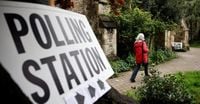On May 1, 2025, millions of voters across England are heading to the polls for a critical test of political strength amid a shifting electoral landscape. The local elections encompass 1,641 council seats across 23 local authorities, alongside a parliamentary by-election in Runcorn and Helsby, triggered by the resignation of former Labour MP Mike Amesbury following a conviction for assault.
This election marks a significant moment for Sir Keir Starmer’s Labour Party, which faces predictions of a challenging night. According to elections expert Lord Hayward, Labour is bracing for what he describes as a "bad night." Meanwhile, polling from the New Statesman indicates a potential for moderate Labour gains, with the party aiming to capitalize on expected Tory losses.
In the West of England mayoral race, Labour's candidate Helen Godwin is reported to have a "paper thin" lead at 23%, closely followed by the Conservative candidate at 21%. The Green and Reform candidates are tied at 18%, while the Liberal Democrats lag behind at 15%. This tight race reflects the fragmented nature of voter support, where all five parties have a feasible chance of winning.
As the results unfold, the Runcorn by-election is expected to garner significant media attention due to its early outcome compared to the slower local counts. Labour’s candidate, Karen Shore, is under pressure to fend off the Reform threat and secure a win. A loss here could amplify concerns within the party about its electoral viability.
In Doncaster, all 55 council seats are up for grabs, with Labour’s incumbent directly elected mayor, Ros Jones, seeking re-election. Currently, Labour holds 41 of those seats, but the Reform Party is keen to capitalize on any weaknesses, with Lord Hayward suggesting that a poor performance could see Reform take control.
The day’s events are not just a referendum on Labour; they also serve as a crucial test for Nigel Farage’s Reform UK party. Polls indicate that Reform is currently polling at 25%, just ahead of Labour at 24% and the Conservatives at 22%. This scenario is unprecedented in the UK’s First Past the Post electoral system, suggesting a potential upheaval in traditional voting patterns.
Farage has expressed optimism about his party's performance, particularly in the mayoral elections, where he anticipates winning "two or three" of the six contests. He has singled out Hull and Lincolnshire as areas of confidence. However, the party's stance on key issues like NHS funding has drawn scrutiny, with Farage calling for an end to tax-based funding without clarifying alternative solutions.
As the clock ticks down towards the closing of polls at 10 PM, voters are reminded of the new ID requirements, which necessitate a form of photographic identification to cast their ballots. This regulation aims to ensure the integrity of the electoral process but could also impact turnout.
Experts are closely watching several key areas, including the outcomes in Durham, Lincolnshire, Staffordshire, and Nottinghamshire, where Reform appears to be in a strong position. The Liberal Democrats are also targeting control in Gloucestershire, Oxfordshire, Shropshire, Cambridgeshire, and Devon, indicating a potential reshaping of the political map.
The elections come at a time of heightened political tension, with the Conservative Party facing substantial losses as they defend over 900 council seats. This election cycle is particularly unpredictable, with the rise of Reform UK and the local Liberal Democrats complicating the traditional two-party dynamic.
As results begin to filter in, the implications of this election will extend beyond immediate council control. The outcomes may signal a shift in public sentiment and the viability of the existing political parties ahead of future general elections. Analysts suggest that a significant loss for the Conservatives could catalyze a leadership crisis, while Labour's ability to maintain its current positions will be closely scrutinized.
In summary, the May 1 local elections and the Runcorn and Helsby by-election represent a pivotal moment in British politics. With all eyes on the results, the stakes are high for Labour, the Conservatives, and Reform UK as they navigate this complex electoral landscape.





